Voices of Change Archival Display
Now in its 50th year, the Penn Women’s Center (PWC) is one of the oldest campus women’s centers in the country. We owe our existence to the courageous protesters who occupied College Hall for four days in April 1973 after a series of rapes on campus.
The 2nd floor of the Penn Women’s Center features an archival display that begins with the 1973 sit-in and offers a documentary “snapshot” of the decades that followed. We are deeply proud of our history and grateful to the generations of students, staff, faculty, alumni, and supporters whose dedicated work to promote gender equity has transformed our campus community over the years.
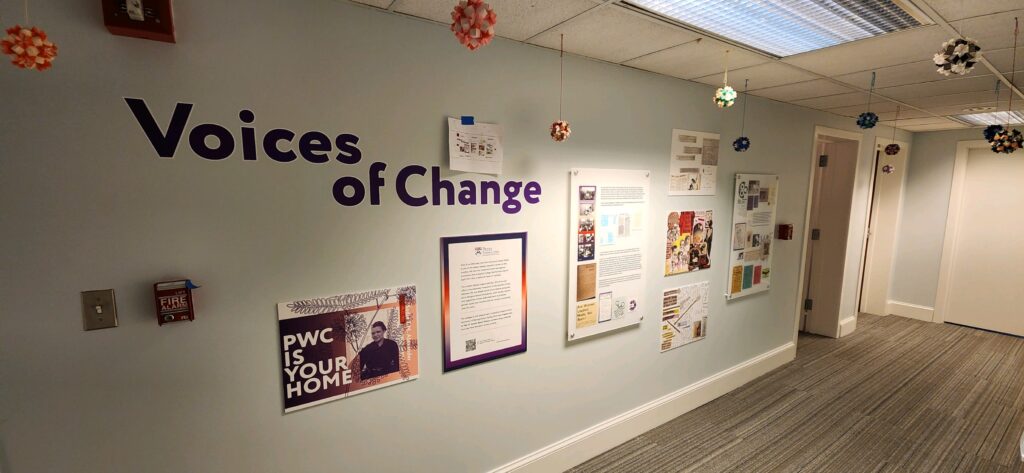
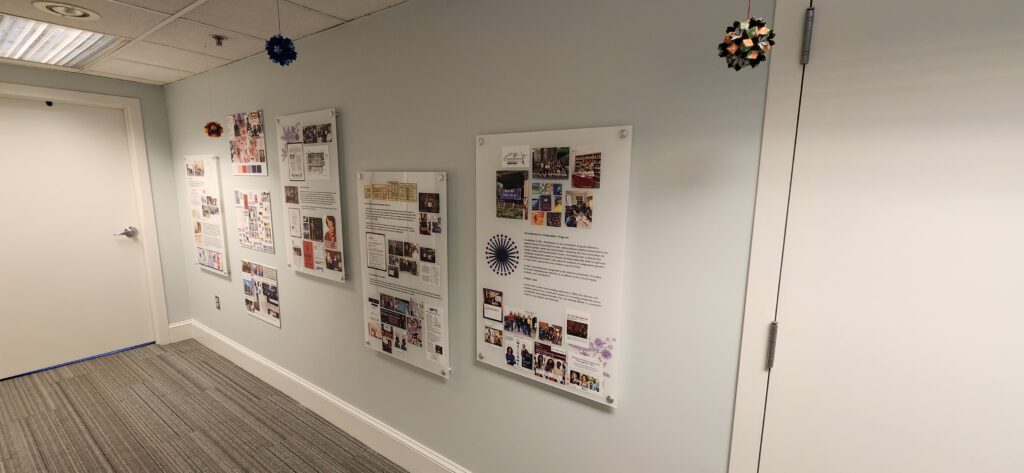
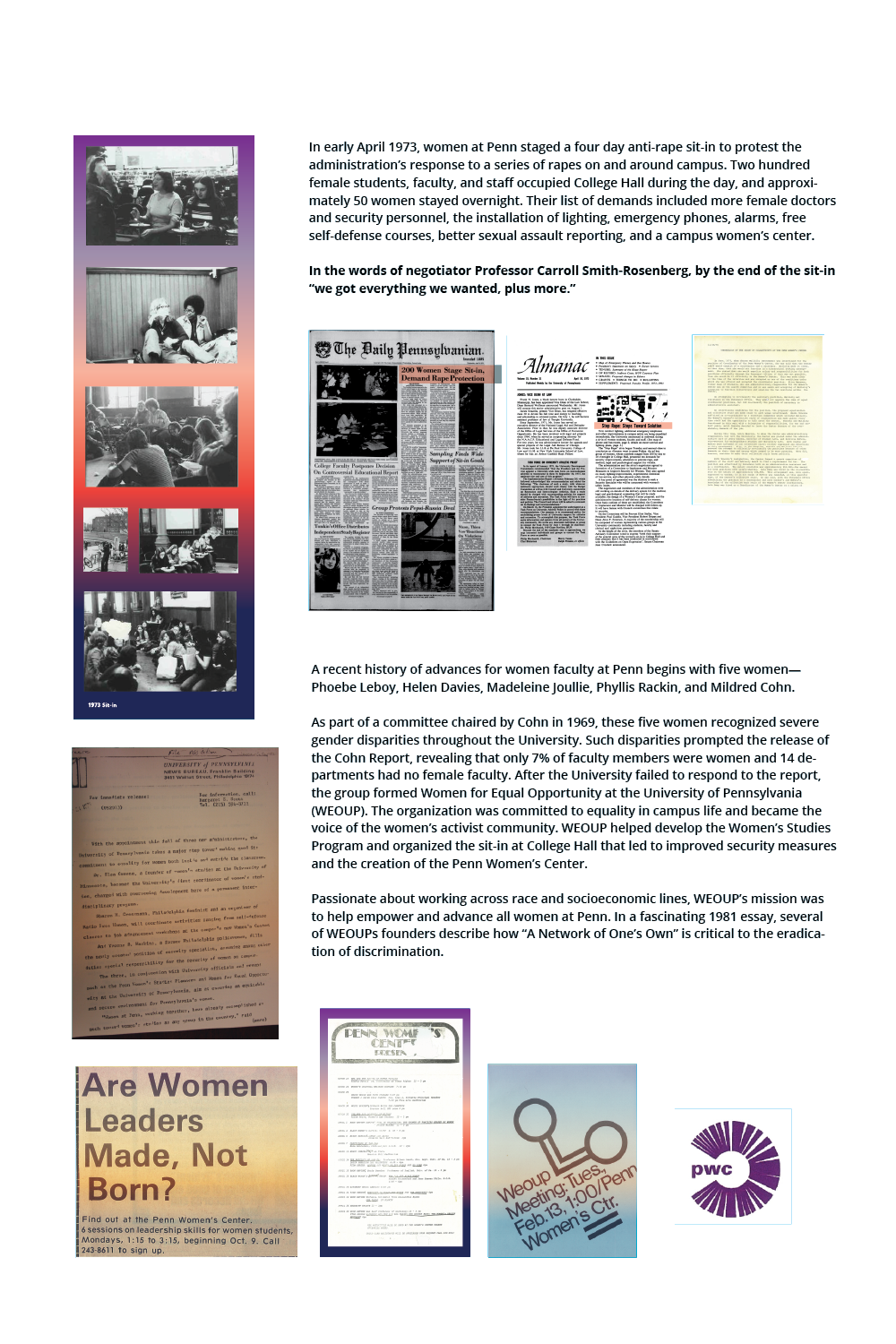
In early April 1973, women at Penn staged a four day anti-rape sit-in to protest the administration’s response to a series of rapes on and around campus. Two hundred female students, faculty, and staff occupied College Hall during the day, and approximately 50 women stayed overnight. Their list of demands included more female doctors and security personnel, the installation of lighting, emergency phones, alarms, free self-defense courses, better sexual assault reporting, and a campus women’s center. In the words of negotiator Professor Carroll Smith-Rosenberg, by the end of the sit-in “we got everything we wanted, plus more.”
A recent history of advances for women faculty at Penn begins with five women—Phoebe Leboy, Helen Davies, Madeleine Joullie, Phyllis Rackin, and Mildred Cohn.
As part of a committee chaired by Cohn in 1969, these five women recognized severe gender disparities throughout the University. Such disparities prompted the release of the Cohn Report, revealing that only 7% of faculty members were women and 14 departments had no female faculty. After the University failed to respond to the report, the group formed Women for Equal Opportunity at the University of Pennsylvania (WEOUP). The organization was committed to equality in campus life and became the voice of the women’s activist community. WEOUP helped develop the Women’s Studies Program and organized the sit-in at College Hall that led to improved security measures and the creation of the Penn Women’s Center.
Passionate about working across race and socioeconomic lines, WEOUP’s mission was to help empower and advance all women at Penn. In a fascinating 1981 essay, several of WEOUPs founders describe how “A Network of One’s Own” is critical to the eradication of discrimination.
In February 1983 the brothers of Alpha Tau Omega were accused of raping a young Penn woman after one of their parties. The case rocked the campus, prompting a 600-person protest rally, and several national news stories. Ultimately, ATO was suspended from campus for eighteen months, all current brothers were permanently banned from membership, and the accused were required to participate in a sexual assault education program.
At the request of the victim, no criminal charges were filed.
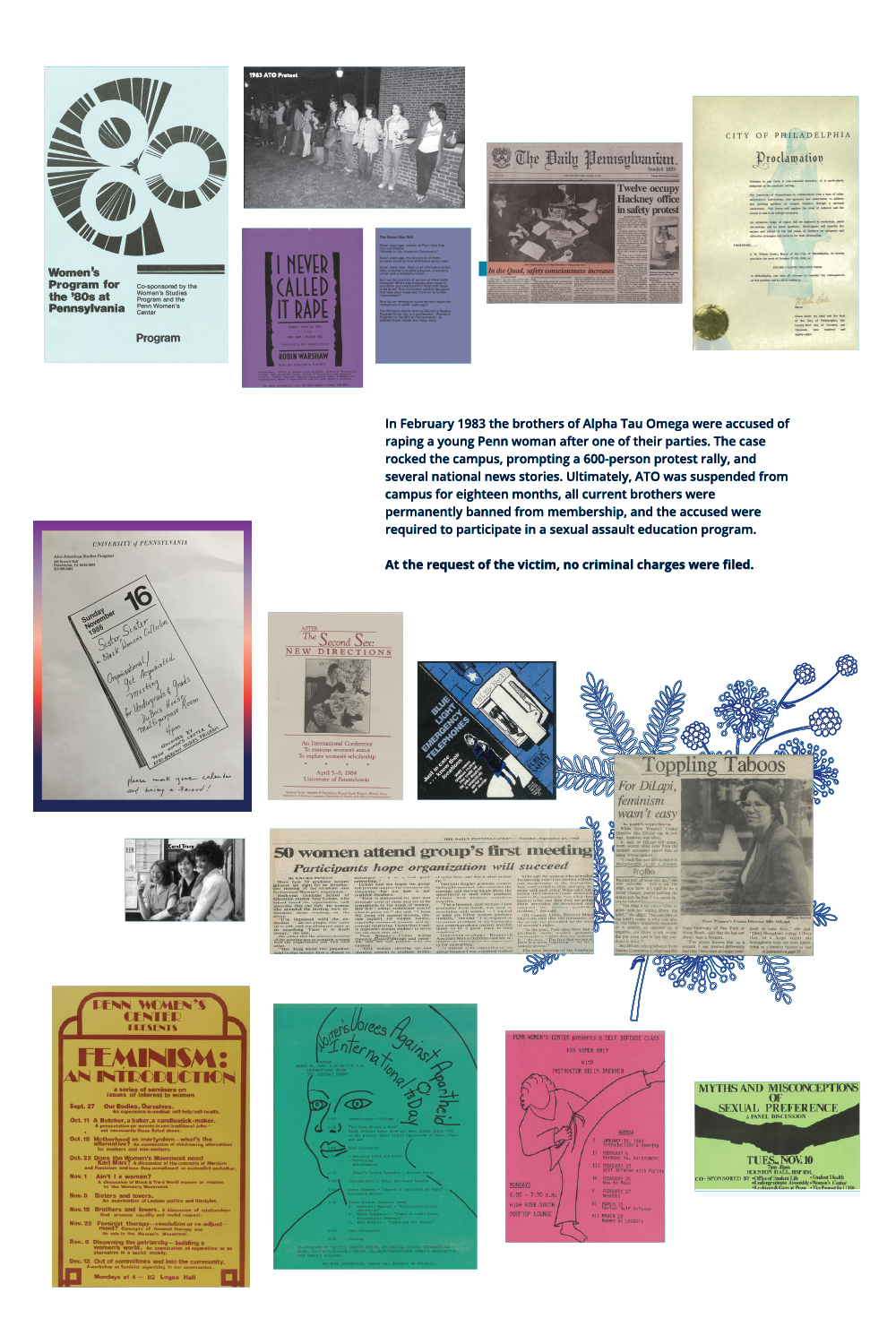
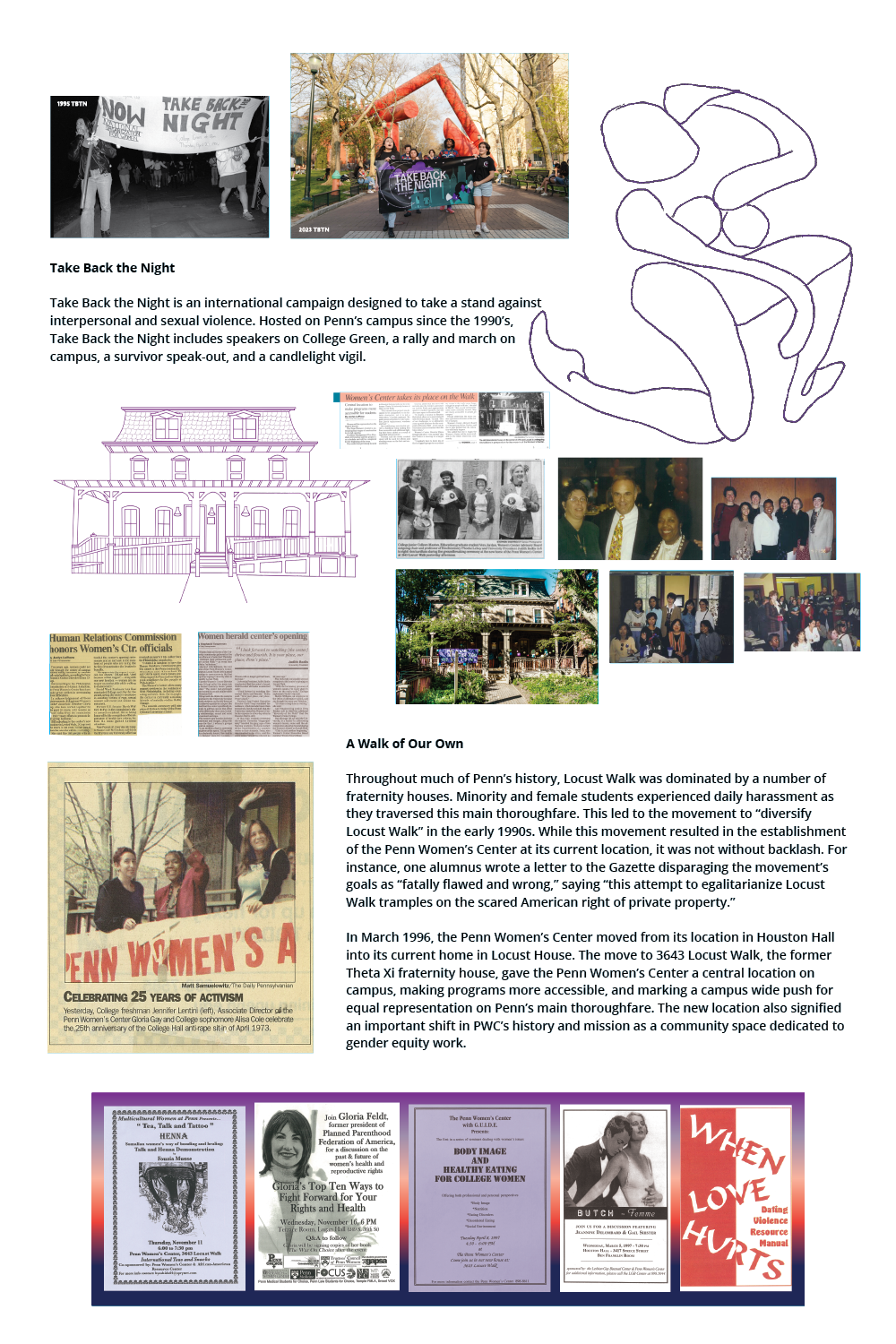
Take Back the Night
Take Back the Night is an international campaign designed to take a stand against interpersonal and sexual violence. Hosted on Penn’s campus since the 1990’s, Take Back the Night includes speakers on College Green, a rally and march on campus, a survivor speak-out, and a candlelight vigil.
A Walk of Our Own
Throughout much of Penn’s history, Locust Walk was dominated by a number of fraternity houses. Minority and female students experienced daily harassment as they traversed this main thoroughfare. This led to the movement to “diversify Locust Walk” in the early 1990s. While this movement resulted in the establishment of the Women’s Center at its current location, it was not without backlash. For instance, one alumnus wrote a letter to the Gazette disparaging the movement’s goals as “fatally flawed and wrong,” saying “this attempt to egalitarianize Locust Walk tramples on the scared American right of private property.”
In March 1996, the Penn Women’s Center moved from its location in Houston Hall into its current home in Locust House. The move to 3643 Locust Walk, the former Theta Xi fraternity house, gave the Penn Women’s Center a central location on campus, making programs more accessible, and marking a campuswide push for equal representation on Penn’s main thoroughfare. The new location also signified an important shift in PWC’s history and mission as a community space dedicated to gender equity work.
Class of 1995 Garden
In 2009, the Penn Women’s Center transformed a cracked concrete platform surrounded by chain-link into a beautiful space at the rear of our center. Designed by Penn’s Landscape Architect, this lovely and intimate garden provides a unique, welcoming space for reading and relaxing on a brick terrace among lush plantings. The garden offers opportunities for hands-on education about sustainable urban horticulture and features seating to promote informal gatherings of students, staff, and faculty.
Thanks to the generous support of the Class of 1995, the PWC garden received a needed makeover and reopened in May 2022.
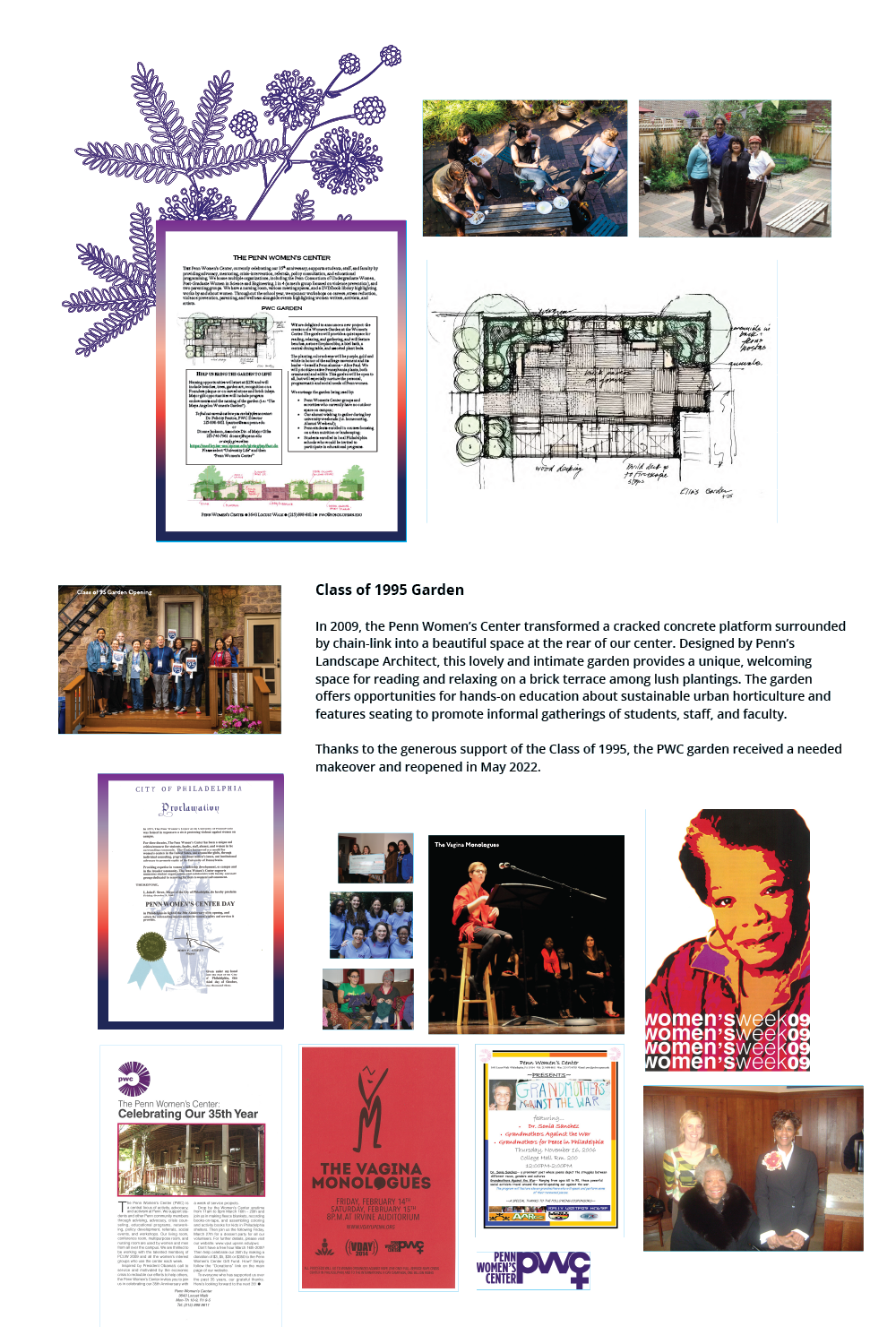
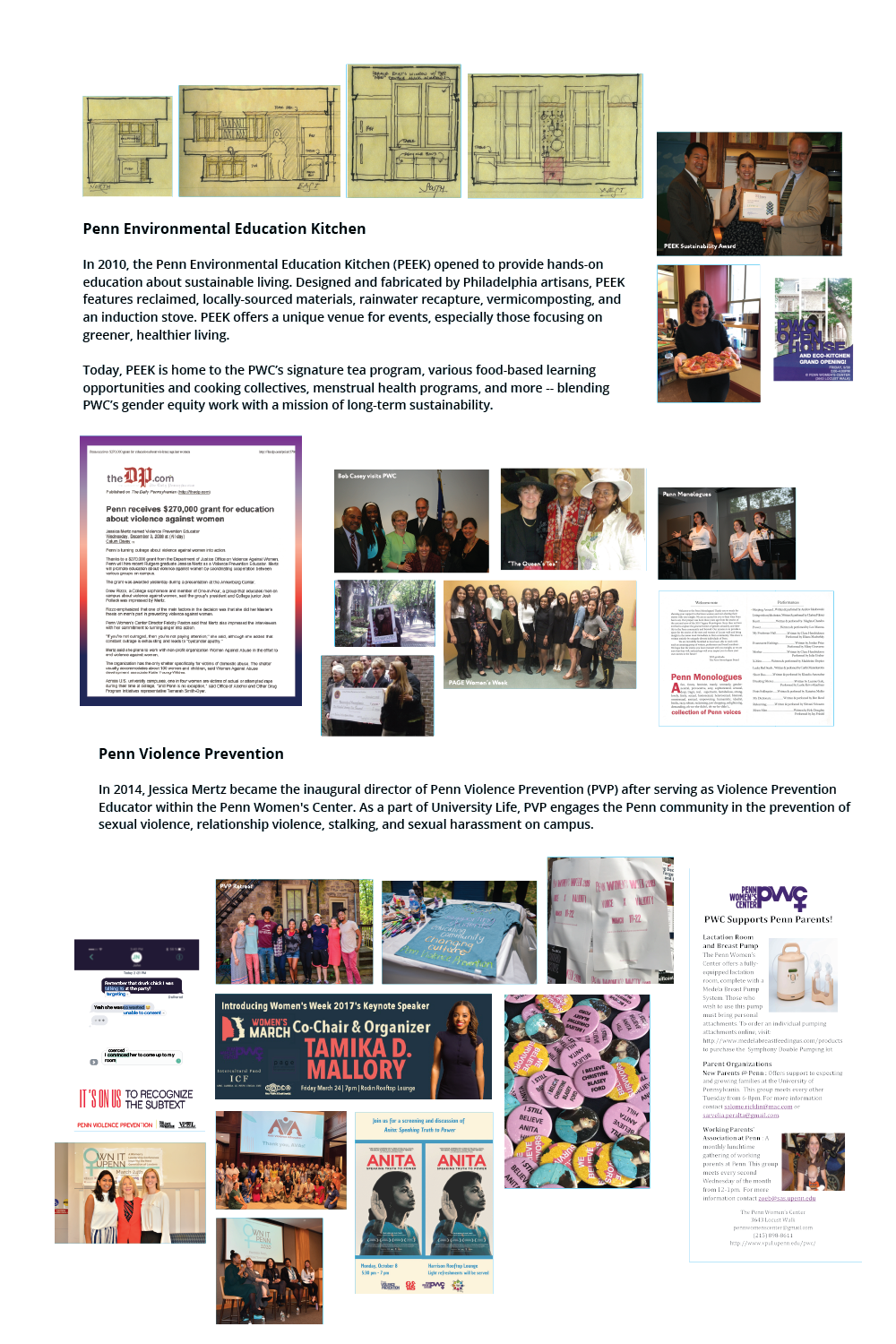
Penn Environmental Education Kitchen
In 2010, the Penn Environmental Education Kitchen (PEEK) opened to provide hands-on education about sustainable living. Designed and fabricated by Philadelphia artisans, PEEK features reclaimed, locally-sourced materials, rainwater recapture, vermicomposting, and an induction stove. PEEK offers a unique venue for events, especially those focusing on greener, healthier living.
Today, PEEK is home to the PWC’s signature tea program, various food-based learning opportunities and cooking collectives, menstrual health programs, and more — blending PWC’s gender equity work with a mission of long-term sustainability.
Penn Violence Prevention
In 2014, PWC’s Violence Prevention Educator, Jessica Mertz, became the inaugural director of Penn Violence Prevention. PVP engages the Penn community in the prevention of sexual violence, relationship violence, stalking, and sexual harassment on campus.
PennGenEq Pre-Orientation Program
Established in 2021, PennGenEq is a pre-orientation program offered to approximately 20 incoming first-year undergraduate students interested in the topics of gender equity and social justice. Hosted by the Penn Association for Gender Equity and Penn Women’s Center, PennGenEq aims to discuss the challenges of gender equity on campus, develop leadership skills for advocacy and organizing, and create a safe space for students of marginalized genders to share their experiences and continue to grow at Penn. In 2023, PennGenEq was recognized by the National Association of Student Personnel Administrators (NASPA) for excellence in the areas of equity, inclusion, and social justice.
A New Look
In 2019, PWC created new branding elements to reflect the vibrancy and inclusive nature of our community. Known for its healing properties and as a symbol for International Women’s Day, the mimosa flower is a prominent feature in our designs and materials.
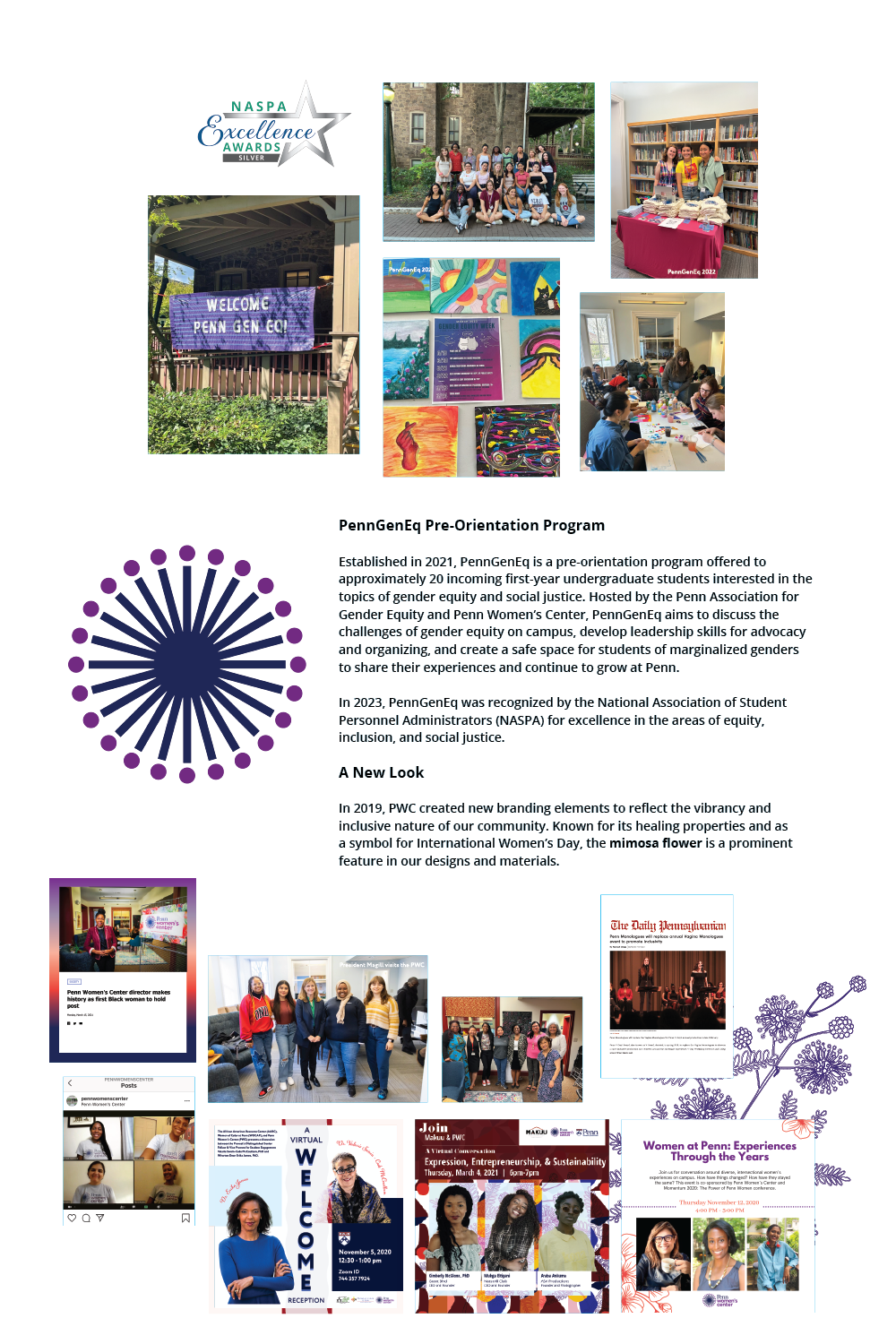
Voices of Change Videos
Voices of Change is a video series we launched in 2013 as part of our 40th anniversary celebrations. This inspiring series features interviews with students, staff, faculty, and alumni and provides unique snapshots of women’s experiences at Penn since our founding in 1973. Voices of Change was funded in part by a grant from the Trustees’ Council of Penn Women.
The 40th anniversary highlights video includes footage from all our interviews in 2013 and focuses on the history and significance of the Penn Women’s Center. The 50th anniversary highlights video includes footage from all our interviews in 2023 and focuses on the growth and transformation of the Penn Women’s Center.
Individual videos from the sets of interviews are listed alphabetically below. Please contact the PWC Director Elisa Foster at elisaf@upenn.edu if you, too, have a story to share or if you would like to learn how you could support this ongoing project.

















